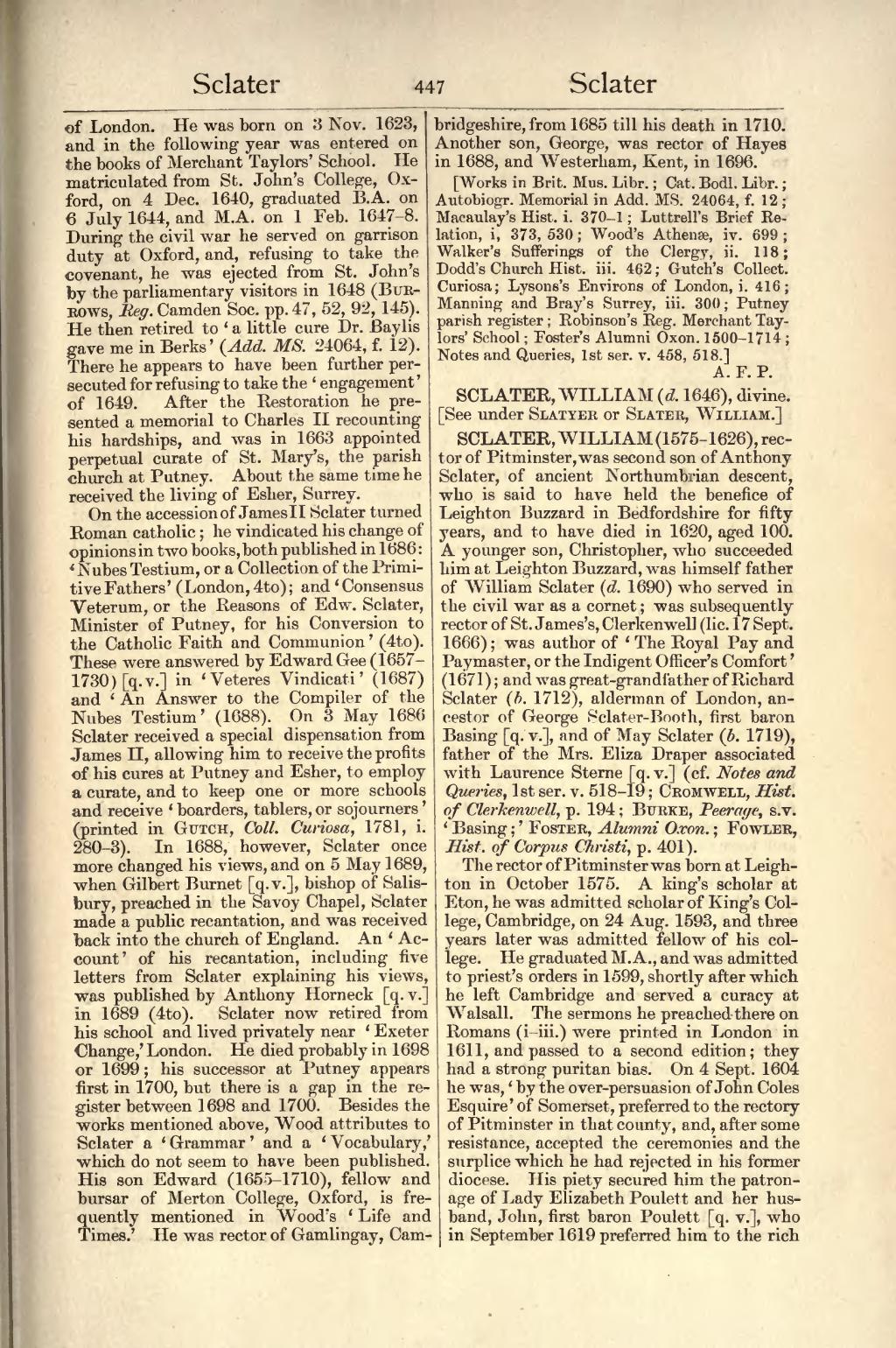of London. He was born on 3 Nov. 1623, and in the following year was entered on the books of Merchant Taylors' School. He matriculated from St. John's College, Oxford, on 4 Dec. 1640, graduated B.A. on 6 July 1644, and M.A. on 1 Feb. 1647–8. During the civil war he served on garrison duty at Oxford, and, refusing to take the covenant, he was ejected from St. John's by the parliamentary visitors in 1648 (Burrows, Reg. Camden Soc. pp. 47, 52, 92, 145). He then retired to ‘a little cure Dr. Baylis gave me in Berks’ (Add. MS. 24064, f. 12). There he appears to have been further persecuted for refusing to take the ‘engagement’ of 1649. After the Restoration he presented a memorial to Charles II recounting his hardships, and was in 1663 appointed perpetual curate of St. Mary's, the parish church at Putney. About the same time he received the living of Esher, Surrey.
On the accession of James II Sclater turned Roman catholic; he vindicated his change of opinions in two books, both published in 1686: ‘Nubes Testium, or a Collection of the Primitive Fathers’ (London, 4to); and ‘Consensus Veterum, or the Reasons of Edw. Sclater, Minister of Putney, for his Conversion to the Catholic Faith and Communion’ (4to). These were answered by Edward Gee (1657–1730) [q. v.] in ‘Veteres Vindicati’ (1687) and ‘An Answer to the Compiler of the Nubes Testium’ (1688). On 3 May 1686 Sclater received a special dispensation from James II, allowing him to receive the profits of his cures at Putney and Esher, to employ a curate, and to keep one or more schools and receive ‘boarders, tablers, or sojourners’ (printed in Gutch, Coll. Curiosa, 1781, i. 280–3). In 1688, however, Sclater once more changed his views, and on 5 May 1689, when Gilbert Burnet [q. v.], bishop of Salisbury, preached in the Savoy Chapel, Sclater made a public recantation, and was received back into the church of England. An ‘Account’ of his recantation, including five letters from Sclater explaining his views, was published by Anthony Horneck [q. v.] in 1689 (4to). Sclater now retired from his school and lived privately near ‘Exeter Change,’ London. He died probably in 1698 or 1699; his successor at Putney appears first in 1700, but there is a gap in the register between 1698 and 1700. Besides the works mentioned above, Wood attributes to Sclater a ‘Grammar’ and a ‘Vocabulary,’ which do not seem to have been published. His son Edward (1655–1710), fellow and bursar of Merton College, Oxford, is frequently mentioned in Wood's ‘Life and Times.’ He was rector of Gamlingay, Cambridgeshire, from 1685 till his death in 1710. Another son, George, was rector of Hayes in 1688, and Westerham, Kent, in 1696.
[Works in Brit. Mus. Libr.; Cat. Bodl. Libr.; Autobiogr. Memorial in Add. MS. 24064, f. 12; Macaulay's Hist. i. 370–1; Luttrell's Brief Relation, i. 373, 530; Wood's Athenæ, iv. 699; Walker's Sufferings of the Clergy, ii. 118; Dodd's Church Hist. iii. 462; Gutch's Collect. Curiosa; Lysons's Environs of London, i. 416; Manning and Bray's Surrey, iii. 300; Putney parish register; Robinson's Reg. Merchant Taylors' School; Foster's Alumni Oxon. 1500–1714; Notes and Queries, 1st ser. v. 458, 518.]
SCLATER, WILLIAM (d. 1646), divine. [See under Slatyer or Slater, William.]
SCLATER, WILLIAM (1575–1626), rector of Pitminster, was second son of Anthony Sclater, of ancient Northumbrian descent, who is said to have held the benefice of Leighton Buzzard in Bedfordshire for fifty years, and to have died in 1620, aged 100. A younger son, Christopher, who succeeded him at Leighton Buzzard, was himself father of William Sclater (d. 1690) who served in the civil war as a cornet; was subsequently rector of St. James's, Clerkenwell (lic. 17 Sept. 1666); was author of 'The Royal Pay and Paymaster, or the Indigent Officer's Comfort' (1671); and was great-grandfather of Richard Sclater (b. 1712), alderman of London, ancestor of George Sclater-Booth, first baron Basing [q. v.], and of May Sclater (b. 1719), father of the Mrs. Eliza Draper associated with Laurence Sterne [q. v.] (cf. Notes and Queries, 1st ser. v. 518-19; Cromwell, Hist. of Clerkenwell, p. 194; Burke, Peerage, s.v. ' Basing;' Foster, Alumni Oxon.; Fowler, Hist. of Corpus Christi, p. 401).
The rector of Pitminster was born at Leighton in October 1575. A king's scholar at Eton, he was admitted scholar of King's College, Cambridge, on 24 Aug. 1593, and three years later was admitted fellow of his college. He graduated M. A., and was admitted to priest's orders in 1599, shortly after which he left Cambridge and served a curacy at Walsall. The sermons he preached there on Romans (i-iii.) were printed in London in 1611, and passed to a second edition; they had a strong puritan bias. On 4 Sept. 1604 he was, 'by the over-persuasion of John Coles Esquire' of Somerset, preferred to the rectory of Pitminster in that county, and, after some resistance, accepted the ceremonies and the surplice which he had rejected in his former diocese. His piety secured him the patronage of Lady Elizabeth Poulett and her husband, John, first baron Poulett [q. v.], who in September 1619 preferred him to the rich
